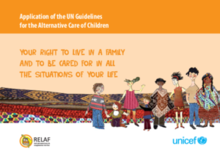This RELAF booklet, Application of the UN Guidelines for the Alternative Care of Children, is a child-friendly guide to the Guidelines of for the Alternative Care of Children meant for children and adolescents to inform them of their right to live with their families and make that right a reality. This book is based on the UN Convention on the Rights of the Child and the Guidelines, which state that all children should be cared for and protected if they cannot live with their parents or are at risk of losing that care, offering recommendations for how decisions should be made about children and their well-being by a State or the private sector.
The booklet first outlines the child’s fundamental right to family and community life, emphasizing the need for every child and adolescent to live with his or her parents. The booklet also describes examples of problematic situations families might face that prevent them from adequately taking care of their children and suggests recommendations to ensure the care of the children in those particular challenging circumstances. It also shares information on proper responses by local governmental authorities when strengthening and supporting a family, when a child is being separated from his or her family, and when determining the most appropriate type of alternative care for a child. It is important that authorities pay attention to the individuality and best interest of the child in these decision-making processes and involve the child and his or her parents or legal guardians as much as possible in determining the best alternative care option.
Furthermore, the booklet draws the differences between informal and formal alternative care, emphasizing the need for official authorities to know the informal care situation of a child when he or she has been placed with a guardian other than his or her parents. It underlines the important fact that alternative caregivers should receive continual support and guidance, and the child must try to maintain his or her contact with biological parents as much as possible. When a child is placed in formal care, it should be acknowledged that alternative care is temporary, support for the child and his or her well-being must be available, the opinion of the child should be taken into consideration, and caregivers must facilitate the reunification of the family whenever appropriate. The booklet also addresses alternative care in special situations such as when a child is outside their birth country or when he or she is in an emergency situation, emphasizing the need to evaluate the situation, acquire necessary documents, and find the family members back in the child’s country of birth.

